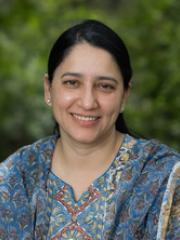Associate Professor Yaqoot Fatima

Researcher biography
Associate Professor Fatima is a Pharmacist, Epidemiologist, Sleep Scientist, and the Research Lead of the "Let's Yarn About Sleep" program. Fatima's research aims to reduce the societal burden of poor sleep and associated health issues through coordinated multidisciplinary, translational research and co-designed programs and service models. She is nationally recognised for leadership in co-designing sleep health programs, workforce training frameworks and service delivery models to improve sleep health care in First Nations communities.
In response to community-identified needs and service gaps, A/Prof Fatima partnered with community members and service providers to co-develop a "ground-up" sleep health movement now known as the Let's Yarn About Sleep (LYAS) program. The partnership discussions were initiated in late 2018 and involved extensive discussion with community Elders and key stakeholders from the partner organisations. These discussions helped understand partners' priorities, facilitated a shared understanding of decision-making processes, identified knowledge and resource-sharing strategies, and underpinned the program's co-development. The LYAS program has significantly improved community awareness and appreciation of sleep health and created pathways for sleep health integration for effective prevention and management of chronic conditions.
The LYAS program is transforming the way the sleep health needs of First Nations peoples are assessed and addressed. The program innovation lies in building local capacity, privileging First Nations voices, empowering end-users, integrating two-world views, interdisciplinary expertise, and diverse research methodologies. These efforts resulted in the UQ-led delivery of Australia's first Indigenous Sleep Coach training, research roles for community members, and integration of sleep health programs in remote schools and health services. The team is now collaborating with 11 communities to strengthen local capacity and capability for achieving sleep health equity and minimise the human, societal and economic costs associated with poor sleep. Furthermore, many other communities and services in Queensland have invited the team for workforce training and sleep health care for First Nations peoples.
